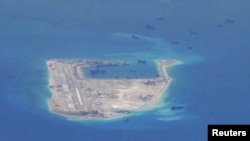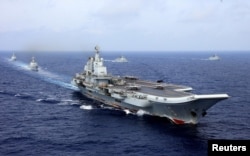The United States is warning China of "consequences" regarding its militarization in the South China Sea, amid reports of new weapons deployments there.
The Trump administration is also increasing the pace and frequency of patrols in the disputed waters to challenge what it says are overly broad maritime claims by nations, under its Asia policy, the "Free and Open Indo-Pacific Strategy."
"We've raised concerns directly with the Chinese about this. And there will be near-term and long-term consequences," said White House Press Secretary Sarah Sanders on Thursday, in response to a question from VOA.
Her remarks come amid media reports that China has deployed anti-ship cruise missiles and surface-to-air missiles to the disputed Spratly Islands in the South China Sea.
Friday, Chinese Foreign Ministry spokesperson Hua Chunying denied such a deployment has anything to do with militarization.
"China's peace-building activities in the Spratly Islands — which are China's own territories, including the deployment of essential national defense facilities, are necessary to safeguard China's sovereignty and security, as well as the natural rights enjoyed by sovereign states," said Hua during a press briefing.
Disputed waters
China claims more than 90 percent of the 3.5 million square kilometer South China Sea, which is rich in fisheries, oil and natural gas and important for shipping lanes.
Brunei, Malaysia, Vietnam, Taiwan and the Philippines also claim parts of the of the sea as their own.
In July of 2016, The Hague's Permanent Court of Arbitration ruled China's territorial claims had no legal validity.
Washington said the ruling is binding, but Beijing said it would not recognize its legality.
While the United States is not a claimant to the sovereignty of disputed islands in the South China Sea, Washington has said China's efforts to militarize outposts in the contested waters endanger the free flow of trade and undermine regional stability, a claim that Beijing rebuts.
Trump's 'Free and Open Indo-Pacific Strategy'
The Trump administration's "Free and Open Indo-Pacific Strategy" has replaced the Obama era policy of "rebalancing" toward Asia
U.S. officials say the Trump administration is seeking an open Indo-Pacific where all nations are "free from coercion" and can pursue paths forward in a sovereign manner. Open sea lines of communication and open airways are said to be a vital part of this thinking.
Pentagon officials said Thursday the U.S. has asked China to understand it is "in their interest" to ensure "there is a free navigation of international waters" in the South China Sea.
"They cannot and should not be hostile and understand that the Pacific is a place in which much commerce goes through," Pentagon spokesperson Dana White told reporters.
Notably, the Trump administration is intensifying the frequency of Freedom of Navigation Operations (FONOPs) by the U.S. Navy in the South China Sea, according to the Congressional Research Service and maritime experts.
"The administration has done a nice job of conducting more freedom of navigation operations," said American Enterprise Institute research fellow Zack Cooper, adding Washington has been low-key about such operations.
U.S. officials tell VOA these patrols mark a legal challenge to overly broad maritime claims by nations.
"FONOPs challenge excessive maritime claims that restrict rights and freedoms provided to all nations under international law," a State Department spokesperson told VOA, on condition of anonymity. "They do not threaten the lawful security interests of coastal states."
Chinese militarization
The Obama administration's "pivot" to East Asia policy did not stop China's militarization in disputed islands in the South China Sea, and experts say the Trump administration's Indo-Pacific strategy is also unlikely to reverse course.
"China made a bet that the U.S. would not risk war over uninhabited rocks and reefs on which it has no claim," said Atlantic Council senior fellow Robert Manning.
Top U.S. military officials and maritime experts warn that China is establishing control over the disputed sea.
Intelligence gathered by the United States during patrols suggest Chinese People's Liberation Army (PLA) had placed communication jamming devices on some of the artificial islands they built in the South China Sea.
"China is now capable of controlling the South China Sea in all scenarios, short of war with the United States," according to U.S. Navy Admiral Philip Davidson, who was nominated to be the next Commander of the Pacific Command.
"If current trends continue, the U.S. Navy will continue to sail through the South China Sea, but those presence operations or freedom of navigation operations will be largely hollow as the waters will effectively be a Chinese lake," Greg Poling, director of the Asia Maritime Transparency Initiative at the Center for Strategic and International Studies told VOA.















